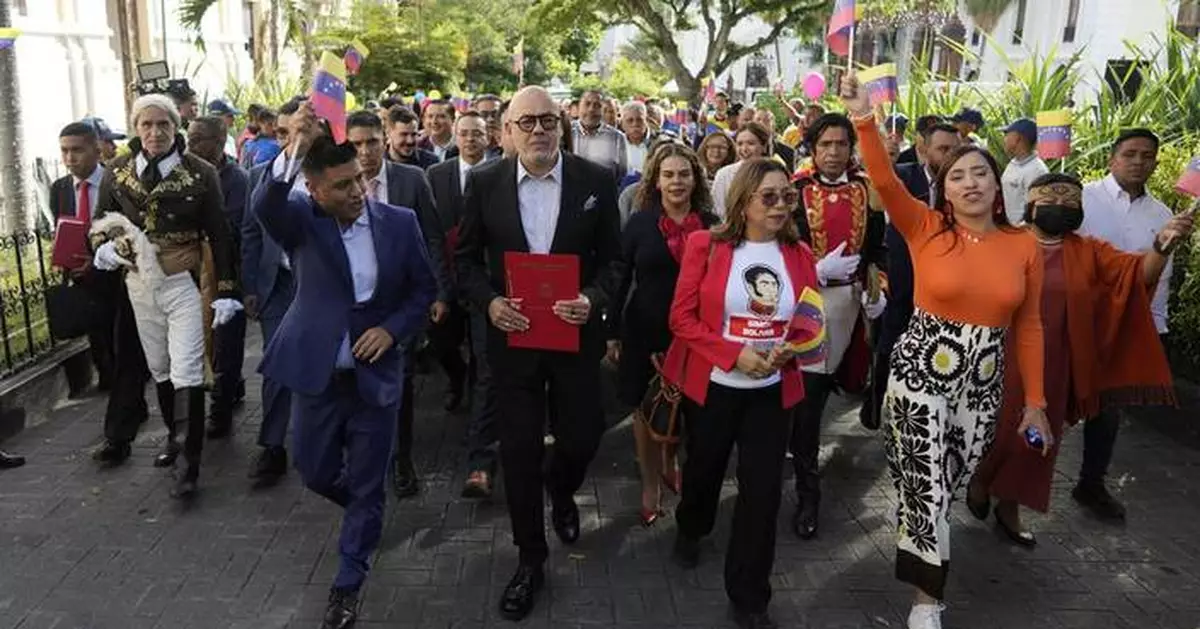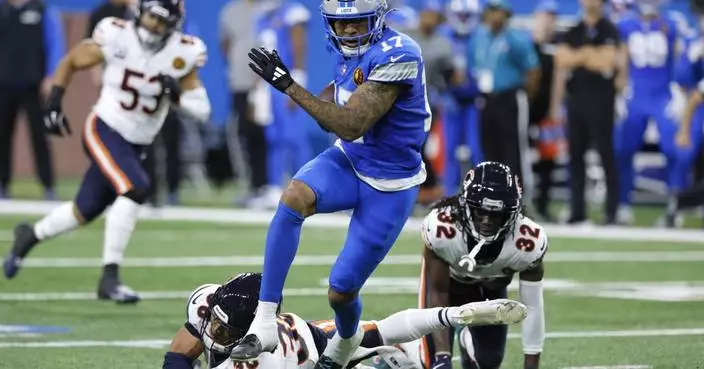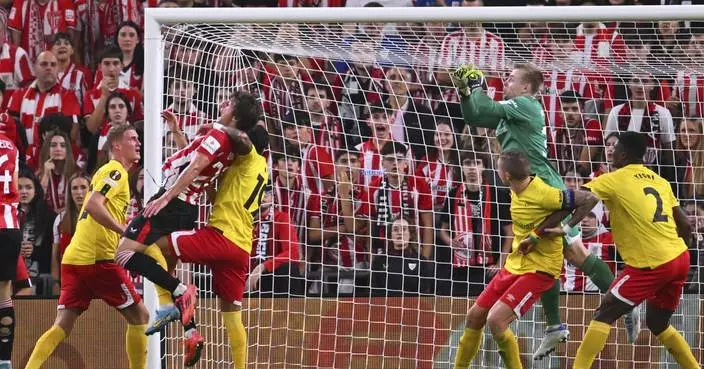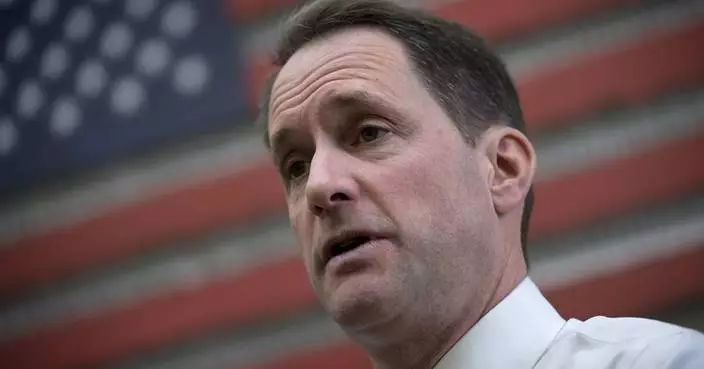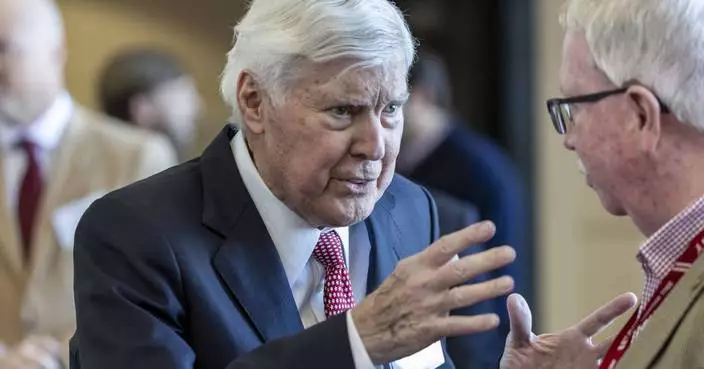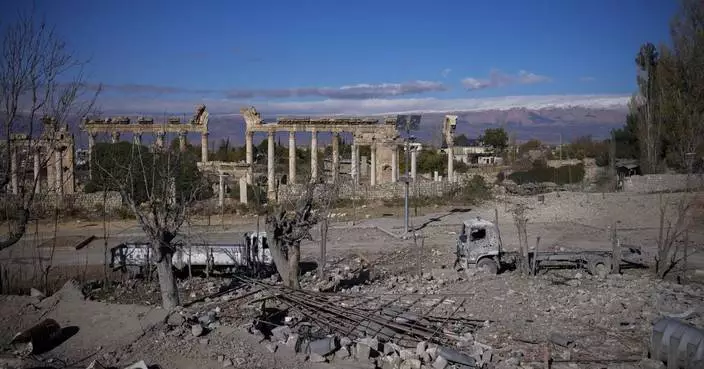CARACAS, Venezuela (AP) — Venezuelan lawmakers on Thursday approved a bill that codifies economic sanctions, like those imposed by the United States, as crimes against humanity and allows the prosecution of anyone who expresses support for the measures.
The bill, approved by the unicameral National Assembly, implicitly targets leading opposition leaders, many of whom have supported economic sanctions as a means to pressure the government into negotiations. The measure bans supporters of economic sanctions from running for office and allows authorities to prosecute them in absentia and seize their property.
“The unilateral coercive measures and other restrictive or punitive measures adopted against the Bolivarian Republic of Venezuela constitute a crime against humanity, within the framework of a systematic and widespread attack against the civilian population,” the bill, as read during Thursday's session, states.
A conviction under the bill would carry a sentence of at least 25 years in prison.
The approval comes one day after the White House announced it had imposed sanctions on 21 individuals it accused of undermining Venezuela’s July presidential election. It also followed the decision by the U.S. House of Representatives last week to pass a bill that would block the federal government from contracting any company doing business with the government of President Nicolás Maduro.
The measure is the latest effort by Venezuela's ruling party to silence dissent after the July election, which Maduro and former diplomat Edmundo González both claim to have won.
Venezuela’s National Electoral Council, which is stacked with Maduro loyalists, declared Maduro the winner hours after polls closed on July 28. But unlike previous presidential elections, electoral authorities did not provide detailed vote counts.
Meanwhile, the main opposition coalition collected tally sheets from 80% of the nation’s electronic voting machines, posted them online and said the voting records showed González won the election with twice as many votes as Maduro.
Anti-government protests erupted nationwide the day after the election, drawing repression from state security forces, which arrested more than 2,200 people, including political leaders, lawyers, poll workers, election volunteers and protesters, both minors and adults.
González left Venezuela in September for exile in Spain after a warrant was issued for his arrest in connection with an investigation into the publishing of the vote tally sheets, while opposition leader Maria Corina Machado has been hiding for months at an undisclosed location.
Machado last year won the presidential primary organized by the main opposition coalition. But Maduro's government kept her off the July 28 ballot via an administrative decision that concluded she could not run for office because she allegedly sought the broad economic sanctions the U.S. imposed last decade in an effort to topple Maduro. The sanctions crippled Venezuela's crucial oil sector.
Machado’s hand-picked substitute was also barred from representing the Unitary Platform opposition coalition. That prompted the faction’s leadership to choose González as candidate.
Last week, Venezuela’s Attorney General’s Office announced a new investigation against Machado. Her comments in favor of the U.S. House bill, according to a statement from the prosecutor's office, “constitute the commission of crimes of treason against the country,” conspiracy with foreign countries and association.
Machado rejected the accusations in a video she posted Thursday on social media.
“Let them accuse us of treason against the country the day we stand by with our arms crossed, when we believe that there is nothing more to fight for,” she said in a video showing images from this year's presidential campaign. “In that moment, accuse us of betraying the country... resigning ourselves would be a betrayal.”
Garcia Cano reported from Mexico City.
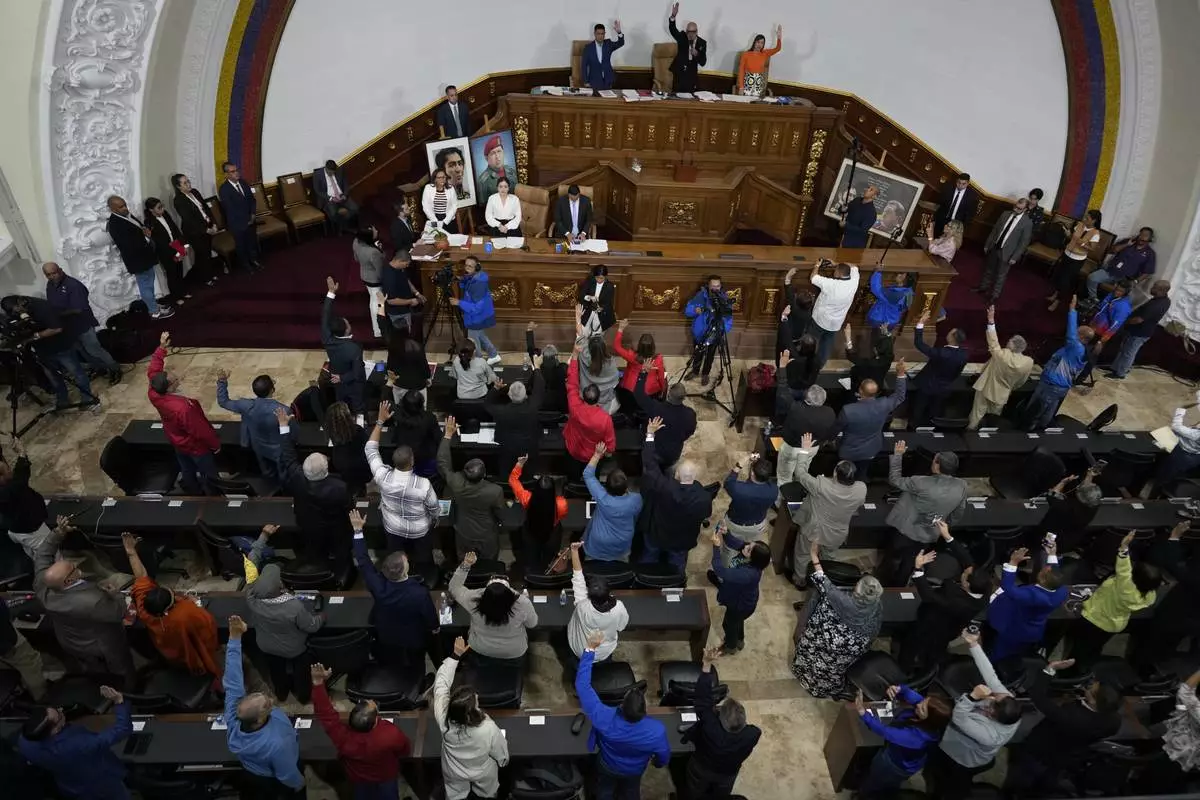
Lawmakers vote for a bill that codifies economic sanctions as a crime against humanity and allows the prosecution of anyone who expresses support for the measures, in Caracas, Venezuela, Thursday, Nov. 28, 2024. (AP Photo/Ariana Cubillos)
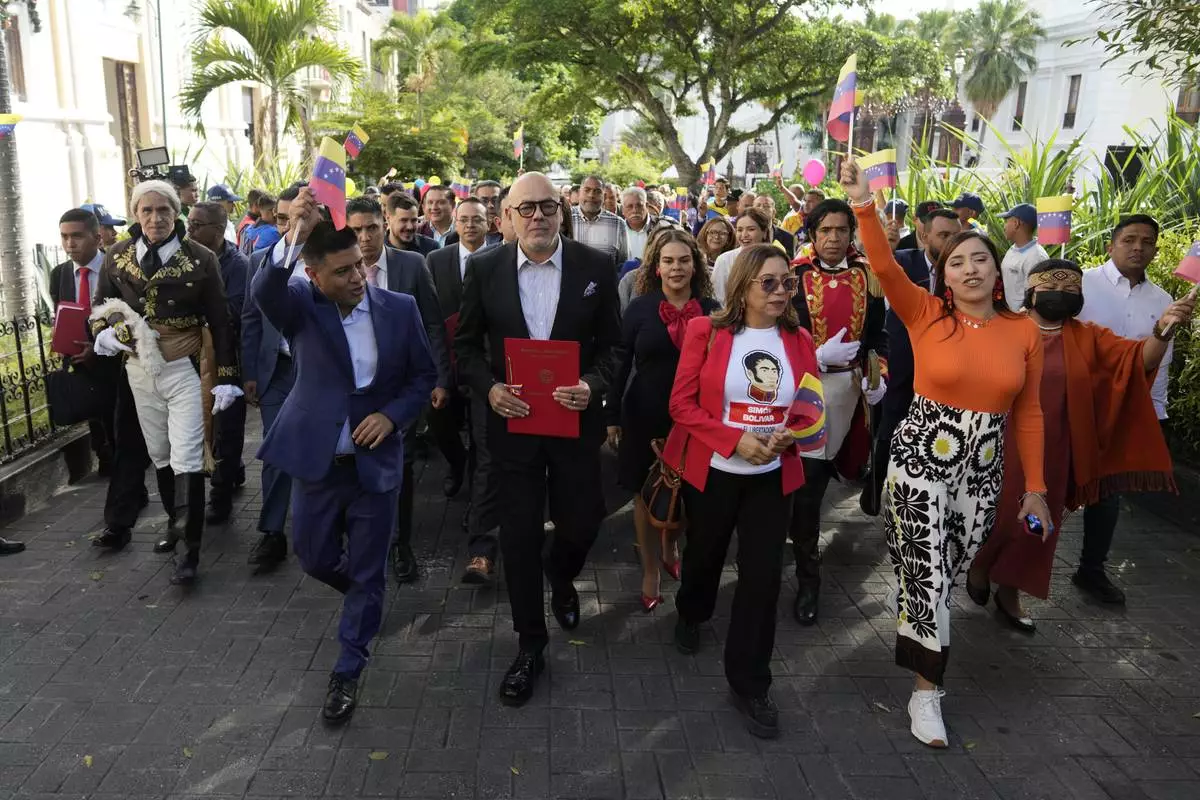
National Assembly President Jorge Rodriguez, center, holds a document of a bill approved by lawmakers that codifies economic sanctions as a crime against humanity and allows the prosecution of anyone who expresses support for the measures, in Caracas, Venezuela, Thursday, Nov. 28, 2024. (AP Photo/Ariana Cubillos)
MELBOURNE, Australia (AP) —
A social media ban for children under 16 passed the Australian Parliament on Friday in a world-first law.
The law will make platforms including TikTok, Facebook, Snapchat, Reddit, X and Instagram liable for fines of up to 50 million Australian dollars ($33 million) for systemic failures to prevent children younger than 16 from holding accounts.
The Senate passed the bill on Thursday 34 votes to 19. The House of Representatives on Wednesday overwhelmingly approved the legislation by 102 votes to 13.
The House on Friday endorsed opposition amendments made in the Senate, making the bill law.
Prime Minister Anthony Albanese said the law supported parents concerned by online harms to their children.
“Platforms now have a social responsibility to ensure the safety of our kids is a priority for them,” Albanese told reporters.
The platforms have one year to work out how they could implement the ban before penalties are enforced.
Meta Platforms, which owns Facebook and Instagram, said the legislation had been “rushed.”
Digital Industry Group Inc., an advocate for the platforms in Australia, said questions remain about the law’s impact on children, its technical foundations and scope.
“The social media ban legislation has been released and passed within a week and, as a result, no one can confidently explain how it will work in practice – the community and platforms are in the dark about what exactly is required of them,” DIGI managing director Sunita Bose said.
The amendments bolster privacy protections. Platforms would not be allowed to compel users to provide government-issued identity documents including passports or driver’s licenses, nor could they demand digital identification through a government system.
Critics of the legislation fear that banning young children from social media will impact the privacy of users who must establish they are older than 16.
While the major parties support the ban, many child welfare and mental health advocates are concerned about unintended consequences.
Sen. David Shoebridge, from the minority Greens party, said mental health experts agreed that the ban could dangerously isolate many children who used social media to find support.
“This policy will hurt vulnerable young people the most, especially in regional communities and especially the LGBTQI community, by cutting them off,” Shoebridge told the Senate.
Opposition Sen. Maria Kovacic said the bill was not radical but necessary. “The core focus of this legislation is simple: It demands that social media companies take reasonable steps to identify and remove underage users from their platforms,” Kovacic told the Senate.
“This is a responsibility these companies should have been fulfilling long ago, but for too long they have shirked these responsibilities in favor of profit,” she added.
Online safety campaigner Sonya Ryan, whose 15-year-old daughter Carly was murdered by a 50-year-old pedophile who pretended to be a teenager online, described the Senate vote as a “monumental moment in protecting our children from horrendous harms online.”
“It’s too late for my daughter, Carly, and the many other children who have suffered terribly and those who have lost their lives in Australia, but let us stand together on their behalf and embrace this together,” she said.
Wayne Holdsworth, whose teenage son Mac took his own life after falling victim to an online sextortion scam, had advocated for the age restriction and took pride in its passage.
“I have always been a proud Australian, but for me subsequent to today’s Senate decision, I am bursting with pride,” Holdsworth said.
Christopher Stone, executive director of Suicide Prevention Australia, the governing body for the suicide prevention sector, said the legislation failed to consider positive aspects of social media in supporting young people’s mental health and sense of connection.
“The government is running blindfolded into a brick wall by rushing this legislation. Young Australians deserve evidence-based policies, not decisions made in haste,” Stone said.
The platforms had complained that the law would be unworkable and had urged the Senate to delay the vote until at least June 2025 when a government-commissioned evaluation of age assurance technologies will report on how young children could be excluded.
“Naturally, we respect the laws decided by the Australian Parliament," Facebook and Instagram owner Meta Platforms said. “However, we are concerned about the process which rushed the legislation through while failing to properly consider the evidence, what industry already does to ensure age-appropriate experiences, and the voices of young people.”
Critics argue the government is attempting to convince parents it is protecting their children ahead of a general election due by May. The government hopes that voters will reward it for responding to parents’ concerns about their children’s addiction to social media. Some argue the legislation could cause more harm than it prevents.
Criticisms include that the legislation was rushed through Parliament without adequate scrutiny, is ineffective, poses privacy risks for all users, and undermines the authority of parents to make decisions for their children.
Opponents also argue the ban would isolate children, deprive them of the positive aspects of social media, drive them to the dark web, discourage children too young for social media to report harm, and reduce incentives for platforms to improve online safety.
AP Business Writer Kelvin Chan in London contributed to this report.
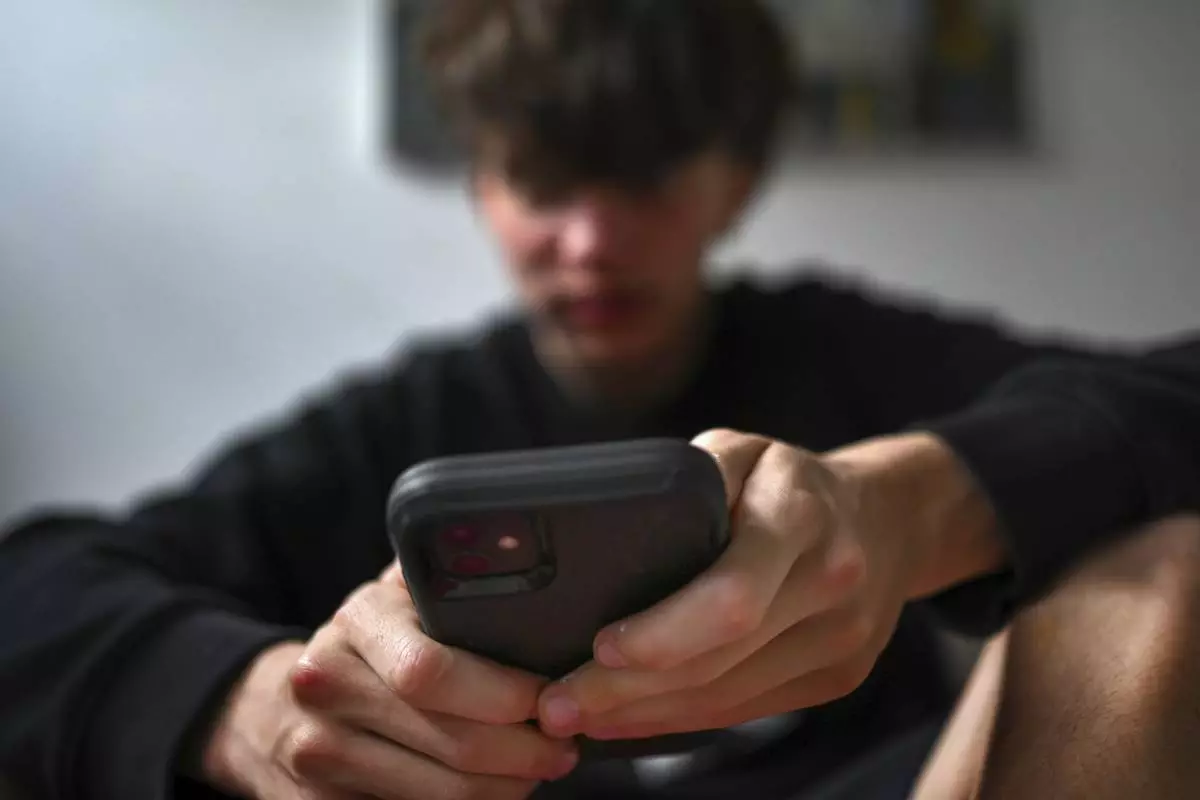
A teenager uses his mobile phone to access social media, Sydney, Wednesday, Nov. 13, 2024. (Dean Lewins/AAP Image VIA AP)




